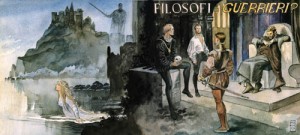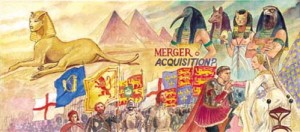The first issue of Hamlet apperead in March 1997. The magazine is published fortnightly by the AIDP (Associazione Italiana per la Direzione del Personale, Italian Association for Personnel Management). “The essential aim of the magazine”, as I wrote in the first Editorial, “is to stimulate debate about policies, methods and tools designed to add value to people in firms”. The challenge was to obtain a wider audience for discussion about the problems of that directly concern all those who work within business (technicians, managers and employees in general) or alongside them (consultants, suppliers, trade unionists, universitary teachers, student and recent graduates, institutional representatives, journalists and politicians). The intention was also to formulate and discuss these problems in an innovative way. Thus, the issue arose of finding a language and theoretical approach that would attract as broad and diversified pubblic as possible, as well as those “in the field”. The solution that was found was the attempt to throw light on the many facets of life in the firm. Each issue focuses on one of these facets, and draws on a wide variety of humanistic and scientific disciplines in order to throw light on it. The ideal common discriminator for all these different contributions is the works of Shakespeare.
At the time it might have seemed heretical to look for an interpretation in Shakespeare of arguments that are almost exclusively discussed in the area of “scientific management”. Besides, it might seem mad to attempt to analyse business conditions with tools and contributions from different cultural areas (literature and the cinema, painting and metaphysics, political philosophy and science fiction) that seem a long way from the routine questions that business deal with. The method in the madness has, however, borne interesting and practical results. In the first place, the risk was avoided of making the magazine a mere crossroads for fantasies, hopes and utopias of a small group of dreamers. The magazine would then have been a sort of magic Macondo taht was cut off from the harsh conditions of contemporary life. The magazine does have access, in fact, to experts from politics, insitutions, trade unions, industry and business, as well as culture in general and some well known international management gurus. Above all, however, the magazine anticipated in Italy one of the most recent trends in international publishing. This was the systematic managerial interpretation of Shakespeare’s (or, if one prefers, the Shakespearean interpretation of management).
in Shakespeare of arguments that are almost exclusively discussed in the area of “scientific management”. Besides, it might seem mad to attempt to analyse business conditions with tools and contributions from different cultural areas (literature and the cinema, painting and metaphysics, political philosophy and science fiction) that seem a long way from the routine questions that business deal with. The method in the madness has, however, borne interesting and practical results. In the first place, the risk was avoided of making the magazine a mere crossroads for fantasies, hopes and utopias of a small group of dreamers. The magazine would then have been a sort of magic Macondo taht was cut off from the harsh conditions of contemporary life. The magazine does have access, in fact, to experts from politics, insitutions, trade unions, industry and business, as well as culture in general and some well known international management gurus. Above all, however, the magazine anticipated in Italy one of the most recent trends in international publishing. This was the systematic managerial interpretation of Shakespeare’s (or, if one prefers, the Shakespearean interpretation of management).
The road linking the Bard to management was officially opened in USA by Kenneth Adelman and Norman R. Augustine (erstwhile CEO of Locheed), with the publication of their book Shakespeare in Charge: The Bard’s Guide to Leading and Succeeding on the Business Stage. This appeared in 1999, two years after the first issue of Hamlet. A real Shakespeare mania then began to pervade the English-speaking managerial world, with the publication of books like Paul Corrigan’s Shakespeare on Management. Leadership Lessons for Today’s Managers and John O. Whitney and Tina Packer’s Power Plays: Shakespeare’s Lessons in Leadership and Management.
 It is true that there had been before this individual articles and short works offering reflections on the business world based on Shakespeare. These, however, now seem a little like some of Kafka’s “precursors” when seen in the elight of Borges’s classic lesson work. This was not the case of Hamlet. The magazine was ahead of its time; it began its series of Shakespearean thoughts about management in March 1997. From the start, it went beyond the approach suggested by the three experts that have been referred to. These writers essentially use Shakespeare to find lessons for leadership taht are still valid. They analyse, often brillantly, works like Richard III, Julius Caesar, Macbeth, King Lear and, above all, Henry V (the only successful leader in Shakespeare).
It is true that there had been before this individual articles and short works offering reflections on the business world based on Shakespeare. These, however, now seem a little like some of Kafka’s “precursors” when seen in the elight of Borges’s classic lesson work. This was not the case of Hamlet. The magazine was ahead of its time; it began its series of Shakespearean thoughts about management in March 1997. From the start, it went beyond the approach suggested by the three experts that have been referred to. These writers essentially use Shakespeare to find lessons for leadership taht are still valid. They analyse, often brillantly, works like Richard III, Julius Caesar, Macbeth, King Lear and, above all, Henry V (the only successful leader in Shakespeare).  What is very significant is that they almost totally ignore Hamlet. I argue that the play contains very significant lessons, but that these cannot be treated in terms of “leadership lessons” taht top managers could easily understand and put into practise. While I agree that this type of study is useful, I think that Shakespeare can be examined in a much more structured way. The author at the centre of the Western Canon is an inexhaustible source of inspiration of ourselves, the organitations in which we work, and the society in which we live. Every daily experience, both within and outside the workplace, can be profitably interpreted by using the conceptual tools to be found in Shakespeare’s wisdom and great literature. “The true use of Shakespeare”, wrote Harold Bloom, “or of Cervantes, of Homer or of Dante, of Chaucer or of Rabelais, is to augment one’s own growing self”. This is very true, but our interior growth depends on our ability to enter into dialogue not only with our own mind, as the solipsistic Bloom would want, but with other people’s mind as well.
What is very significant is that they almost totally ignore Hamlet. I argue that the play contains very significant lessons, but that these cannot be treated in terms of “leadership lessons” taht top managers could easily understand and put into practise. While I agree that this type of study is useful, I think that Shakespeare can be examined in a much more structured way. The author at the centre of the Western Canon is an inexhaustible source of inspiration of ourselves, the organitations in which we work, and the society in which we live. Every daily experience, both within and outside the workplace, can be profitably interpreted by using the conceptual tools to be found in Shakespeare’s wisdom and great literature. “The true use of Shakespeare”, wrote Harold Bloom, “or of Cervantes, of Homer or of Dante, of Chaucer or of Rabelais, is to augment one’s own growing self”. This is very true, but our interior growth depends on our ability to enter into dialogue not only with our own mind, as the solipsistic Bloom would want, but with other people’s mind as well.
Humanistic Management 2.0
- Home
- Origins of Humanistic Management in Italy: the ockhamist organization
- Agip Library
- The Shakespearian Company
- The Humanistic Management Manifesto
- Nothing twice. The Management seen through the poetry by Wisława Szymborska
- The Humanistic Management chair
- The In-Visible Corporation
- Web Opera
- ideaTRE60
- Postmodern Alice
- Founder & CEO of Humanistic Management 2.0
- News
- About Marco Minghetti
- Selected Excerpts
- Home
Feed RSS Subscriptions
Email subscriptions
About
Social media
Tag
Alice Alice in Wonderland Alice Wonderland Carroll Shakespeare Postmodern Baricco Deleuze Digital Awards Frank Kermode gary hamel George Steiner Hamlet Harold Bloom humanistic management labirinth Looking Glass management Management 2.0 Hackathon map Marco Minghetti poetry Postmodern Raymond Queneau Shakespeare Snark Stevenson Wislawa Szymborska Wonderland


Latest Comments